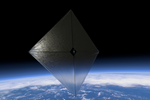NASA selects Rocket Lab to launch composite solar sail
NASA’s Advanced Composite Solar Sail System is expected to launch from Rocket Lab’s Electron carbon fiber composite launch vehicle in mid-2022.
(Long Beach, Calif., U.S.), a leader in launch services and space systems, has been selected to launch ’s (Washington D.C., U.S.) Advanced Composite Solar Sail System (ACS3) on its Electron launch vehicle.
NASA’s ACS3 technology uses composite materials in its novel, lightweight booms that deploy from a CubeSat to support a solar sail. Solar sails are designed to employ the pressure of sunlight for propulsion, eliminating the need for a conventional rocket propellant.
ACS3 is scheduled for lift-off from Rocket Lab Launch Complex 1 in mid-2022. The Electron launch vehicle’s Kick Stage is capable of deploying individual satellites to unique orbits even when flying as part of a rideshare, which was a key factor in Rocket Lab being selected as the launch provider. ACS3 requires a higher altitude than the other rideshare payloads launching on the same mission, so after deploying the first payloads, the Kick Stage will perform another burn with its 3D-printed Curie engine to raise the orbit and deploy ACS3.
According to NASA, data obtained from the ACS3 demonstration will guide the design of future larger scale composite solar sail systems that could be used for space weather early warning satellites, near-Earth asteroid reconnaissance missions or communications relays for crewed exploration missions.
Peter Beck, Rocket Lab’s founder and chief executive, says, “It seems fitting to launch NASA’s Advanced Composite Solar Sail System on Electron, the world’s first full carbon [fiber] composite orbital launch vehicle. We’re excited to see composites used yet again to unlock new capabilities in space.”
Related Content
-
Revisiting the OceanGate Titan disaster
A year has passed since the tragic loss of the Titan submersible that claimed the lives of five people. What lessons have been learned from the disaster?
-
Plant tour: Airbus, Illescas, Spain
Airbus’ Illescas facility, featuring highly automated composites processes for the A350 lower wing cover and one-piece Section 19 fuselage barrels, works toward production ramp-ups and next-generation aircraft.
-
Low-cost, efficient CFRP anisogrid lattice structures
CIRA uses patented parallel winding, dry fiber, silicone tooling and resin infusion to cut labor for lightweight, heavily loaded space applications.






